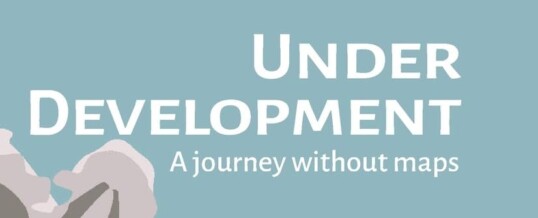
McLeod Group blog by Rhonda Gossen and Jane Cooper, August 19, 2024
The new memoir by Ian Smillie, Under Development: A journey without maps, takes the reader on the bumpy ride of international development from the late 1960s over more than four decades through the trends and geopolitical contexts that impact aid spending. An entertaining, but also challenging trip through the decades, from the “post-colonial excitement” and early international volunteering in Africa (before development kicked in) to the “integrated rural development” of the 1970s, to the more recent surge in humanitarian action in conflict zones that has forcibly displaced more than 80 million people.
Smillie’s book shows just how vast and complex a subject international development is. It is a window into this world, recounting an earlier era and compiling a story of “50 years of lost opportunities and failed promises” alongside some resounding successes. He asks whether aid works and answers that there is evidence that it can work, providing examples from his own experience in efforts such as community-based rural development in Bangladesh by BRAC and in Pakistan by the Aga Khan Rural Support Program, capacity building of civil society in the global south in their work with poor people, and the policy-level work of the Kimberley Process which mitigated the impact of the trade in conflict diamonds on the poor and vulnerable in Sierra Leone and Liberia.
The early accounts of CUSO volunteers can’t help but make one think about how international volunteering has changed since he and others like Nancy Christine Edwards (who also writes about volunteering) spent time in Sierra Leone – and about if, or how it can work. The Canadian government has been funding volunteer assignments for Canadians in foreign parts since the early 1960s, with the current Volunteer Co-operation Program aspiring to place some 10,000 Canadians in over 50 countries around the world between 2020 and 2028. Apparently, the government thinks the world still needs more Canada. But are volunteers what the world needs from Canada now? And can we supply them if they are needed?
In Ian and Nancy’s day – the late 1970s and early 1980s – a typical volunteer committed to two years or more and headed off to remote communities where electricity and running water were erratic, if available at all, there was no TV (and no one had even thought of the Internet) and “snail-mail” had real meaning. Volunteering in those days was inevitably an immersive experience, with distractions from home limited to occasional letters. At the same time, the volunteer’s basic role was often clear, as they were slotted into obvious skills gaps like trained teachers and medical staff.
That’s a long time ago. Volunteers today are often only prepared – or can only afford to – dip their toes into a new country for a few months. And in our connected world, they are still here while they are there, sucked into daily contact with home through ubiquitous connectivity. At the same time, the roles on offer can be hazy, particularly since there are well-trained local people available who can take on any job that comes with a reasonable salary.
As they look back, writers like Ian and Nancy can clearly articulate how their volunteer experiences set the trajectory for the rest of their lives. The institutions that they supported as volunteers eventually disappeared into the morass of the Sierra Leone civil war. But the longer-term work they were inspired to do in their careers made long-lasting contributions both in Canada and internationally. Nancy taught nursing at the University of Ottawa for many years and became a leader in population and public health, influencing community health strategies across four continents. Ian went on to become an influential NGO leader in Canada and is perhaps most famous for his sustained fight to make the world take notice of how the trade in illegal diamonds was driving wars in Africa.
It can sound very colonial to imagine that a Canadian on a flying short-term assignment can be much use in another country. But when there is a longer, deeper exchange of ideas and skills between people, the benefits can be real.
Likewise small grants to and from NGOs can have a real and strategic impact. Smillie started the Canadian NGO Inter Pares with just $60,000 in the 1970s, which in turn supported the development of civil society in countries where they worked.
Smillie reflects on whether claims of poverty reduction have received enough scrutiny. While we see evidence of poverty reduction around the world, we also sense that, as he says, we may not fully understand its magnitude. The conclusion though is that working towards ending global poverty is still the right thing to do. He writes, “There are no silver bullets; poverty cannot be ended with small, one-off feel-good investments. Development takes time and money, and it usually requires strong and consistent support”, neither of which, in his view, has happened enough.
Rhonda Gossen is a former official at the Canadian International Development Agency and Global Affairs Canada, and currently a consultant to UNDP. She recently published The Twelfth of February: Canadian aid for Gender Equality during the Rise of Violent Extremism in Pakistan. Researcher and writer Jane Cooper started her career as a volunteer in Zimbabwe in the 1980s. Her latest book is What Ukrainian Elections Taught Me About Democracy. Image: Practical Action Publishing.
